Entrepreneurship Report: Ventures, Mindset, and Business Analysis
VerifiedAdded on 2023/01/13
|16
|4855
|29
Report
AI Summary
This report delves into the multifaceted world of entrepreneurship, examining entrepreneurial ventures, the entrepreneurial mindset, and their impact on small business management. The report is divided into two main sections, the first of which explores different types of entrepreneurial ventures, their similarities and differences, and the influence of data and statistics on small, medium, and large businesses. It also investigates the scope, growth, and development of ventures in both public and corporate sectors, providing examples of various entrepreneur types. The second part focuses on the entrepreneurial mindset, encompassing local and global entrepreneurs, social enterprises, and the traits and characteristics that foster or hinder entrepreneurship. The report also discusses the background and experiences influencing entrepreneurship, comparing and contrasting different types of entrepreneurs and their approaches to business.

Entrepreneurship &
Small Business
Management
Small Business
Management
Paraphrase This Document
Need a fresh take? Get an instant paraphrase of this document with our AI Paraphraser

Table of Contents
INTRODUCTION...........................................................................................................................3
PART 1 “Entrepreneurial Ventures”...............................................................................................3
Different type of ventures...........................................................................................................3
Similarities & Differences among entrepreneurial ventures.......................................................5
Data and statistics which affect small, medium and large business............................................5
Investigate & critically examine scope, growth and development of entrepreneurial ventures
in both public as well as corporate sectors..................................................................................7
Examples for each type of entrepreneurs....................................................................................7
Conclusion...................................................................................................................................8
PART 2 “Entrepreneurial Mindset”................................................................................................8
Scope of entrepreneurship which includes local and global entrepreneur and social enterprise,
difference and similarities...........................................................................................................8
Differences between local and global entrepreneur ...................................................................9
Entrepreneurial traits and characteristics, critically evaluate background & experiences which
can either foster or hinder entrepreneurship................................................................................9
Characteristic traits, skills & motivational drivers of a successful entrepreneurs....................11
Discussion about experience and background of entrepreneurs which influences the
entrepreneurship........................................................................................................................12
Conclusion by comparing & contrasting both entrepreneurs....................................................13
REFERENCES..............................................................................................................................14
Books & Journals......................................................................................................................14
INTRODUCTION...........................................................................................................................3
PART 1 “Entrepreneurial Ventures”...............................................................................................3
Different type of ventures...........................................................................................................3
Similarities & Differences among entrepreneurial ventures.......................................................5
Data and statistics which affect small, medium and large business............................................5
Investigate & critically examine scope, growth and development of entrepreneurial ventures
in both public as well as corporate sectors..................................................................................7
Examples for each type of entrepreneurs....................................................................................7
Conclusion...................................................................................................................................8
PART 2 “Entrepreneurial Mindset”................................................................................................8
Scope of entrepreneurship which includes local and global entrepreneur and social enterprise,
difference and similarities...........................................................................................................8
Differences between local and global entrepreneur ...................................................................9
Entrepreneurial traits and characteristics, critically evaluate background & experiences which
can either foster or hinder entrepreneurship................................................................................9
Characteristic traits, skills & motivational drivers of a successful entrepreneurs....................11
Discussion about experience and background of entrepreneurs which influences the
entrepreneurship........................................................................................................................12
Conclusion by comparing & contrasting both entrepreneurs....................................................13
REFERENCES..............................................................................................................................14
Books & Journals......................................................................................................................14
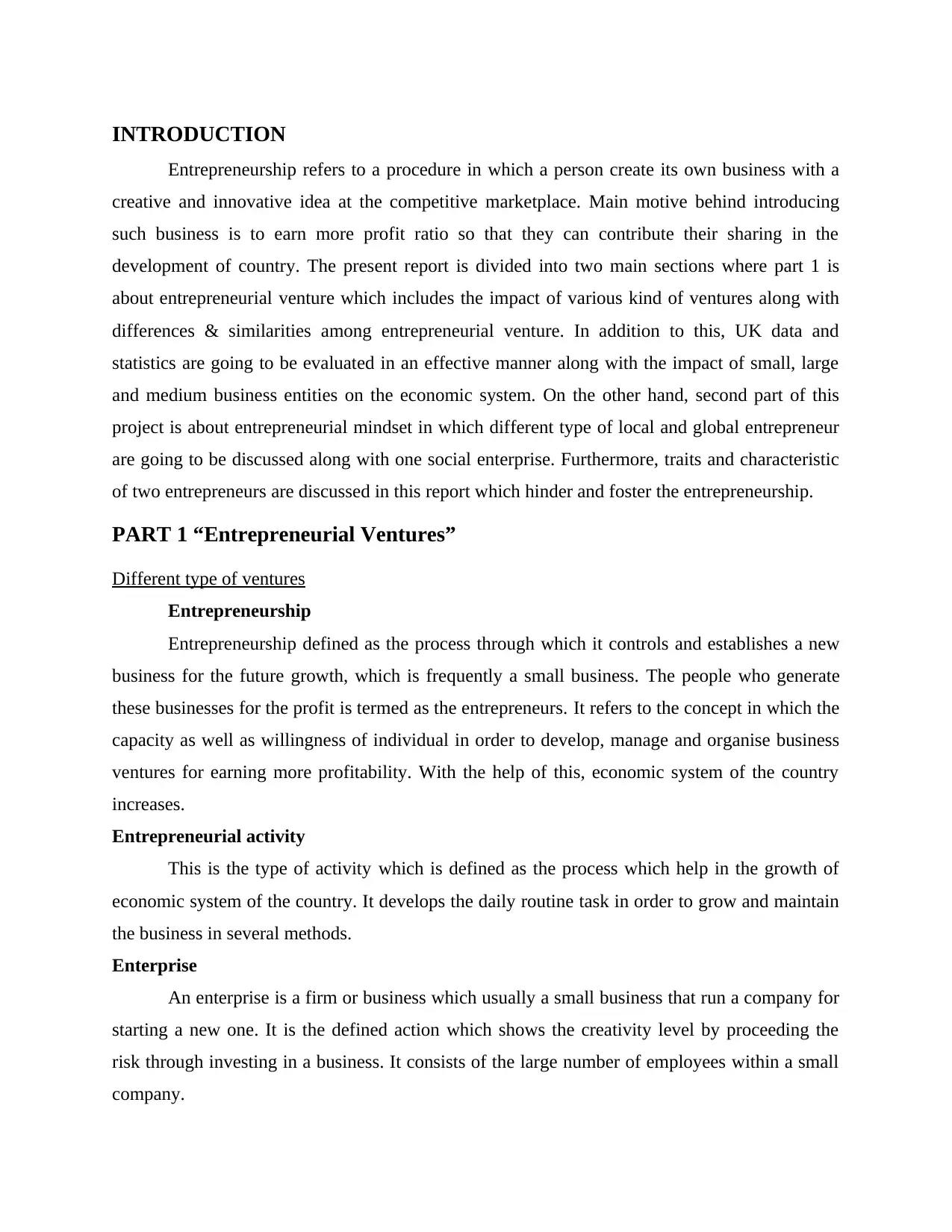
INTRODUCTION
Entrepreneurship refers to a procedure in which a person create its own business with a
creative and innovative idea at the competitive marketplace. Main motive behind introducing
such business is to earn more profit ratio so that they can contribute their sharing in the
development of country. The present report is divided into two main sections where part 1 is
about entrepreneurial venture which includes the impact of various kind of ventures along with
differences & similarities among entrepreneurial venture. In addition to this, UK data and
statistics are going to be evaluated in an effective manner along with the impact of small, large
and medium business entities on the economic system. On the other hand, second part of this
project is about entrepreneurial mindset in which different type of local and global entrepreneur
are going to be discussed along with one social enterprise. Furthermore, traits and characteristic
of two entrepreneurs are discussed in this report which hinder and foster the entrepreneurship.
PART 1 “Entrepreneurial Ventures”
Different type of ventures
Entrepreneurship
Entrepreneurship defined as the process through which it controls and establishes a new
business for the future growth, which is frequently a small business. The people who generate
these businesses for the profit is termed as the entrepreneurs. It refers to the concept in which the
capacity as well as willingness of individual in order to develop, manage and organise business
ventures for earning more profitability. With the help of this, economic system of the country
increases.
Entrepreneurial activity
This is the type of activity which is defined as the process which help in the growth of
economic system of the country. It develops the daily routine task in order to grow and maintain
the business in several methods.
Enterprise
An enterprise is a firm or business which usually a small business that run a company for
starting a new one. It is the defined action which shows the creativity level by proceeding the
risk through investing in a business. It consists of the large number of employees within a small
company.
Entrepreneurship refers to a procedure in which a person create its own business with a
creative and innovative idea at the competitive marketplace. Main motive behind introducing
such business is to earn more profit ratio so that they can contribute their sharing in the
development of country. The present report is divided into two main sections where part 1 is
about entrepreneurial venture which includes the impact of various kind of ventures along with
differences & similarities among entrepreneurial venture. In addition to this, UK data and
statistics are going to be evaluated in an effective manner along with the impact of small, large
and medium business entities on the economic system. On the other hand, second part of this
project is about entrepreneurial mindset in which different type of local and global entrepreneur
are going to be discussed along with one social enterprise. Furthermore, traits and characteristic
of two entrepreneurs are discussed in this report which hinder and foster the entrepreneurship.
PART 1 “Entrepreneurial Ventures”
Different type of ventures
Entrepreneurship
Entrepreneurship defined as the process through which it controls and establishes a new
business for the future growth, which is frequently a small business. The people who generate
these businesses for the profit is termed as the entrepreneurs. It refers to the concept in which the
capacity as well as willingness of individual in order to develop, manage and organise business
ventures for earning more profitability. With the help of this, economic system of the country
increases.
Entrepreneurial activity
This is the type of activity which is defined as the process which help in the growth of
economic system of the country. It develops the daily routine task in order to grow and maintain
the business in several methods.
Enterprise
An enterprise is a firm or business which usually a small business that run a company for
starting a new one. It is the defined action which shows the creativity level by proceeding the
risk through investing in a business. It consists of the large number of employees within a small
company.
⊘ This is a preview!⊘
Do you want full access?
Subscribe today to unlock all pages.

Trusted by 1+ million students worldwide
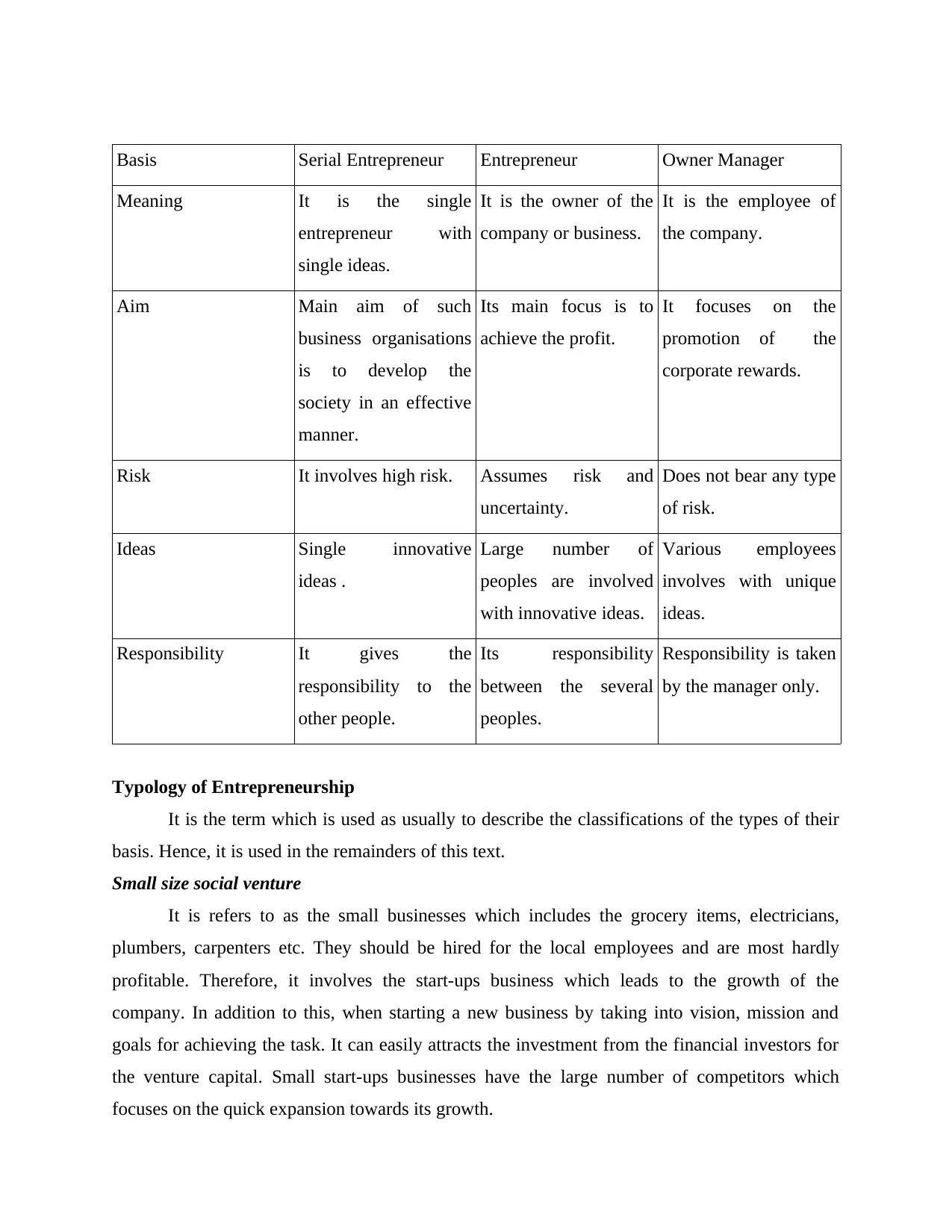
Basis Serial Entrepreneur Entrepreneur Owner Manager
Meaning It is the single
entrepreneur with
single ideas.
It is the owner of the
company or business.
It is the employee of
the company.
Aim Main aim of such
business organisations
is to develop the
society in an effective
manner.
Its main focus is to
achieve the profit.
It focuses on the
promotion of the
corporate rewards.
Risk It involves high risk. Assumes risk and
uncertainty.
Does not bear any type
of risk.
Ideas Single innovative
ideas .
Large number of
peoples are involved
with innovative ideas.
Various employees
involves with unique
ideas.
Responsibility It gives the
responsibility to the
other people.
Its responsibility
between the several
peoples.
Responsibility is taken
by the manager only.
Typology of Entrepreneurship
It is the term which is used as usually to describe the classifications of the types of their
basis. Hence, it is used in the remainders of this text.
Small size social venture
It is refers to as the small businesses which includes the grocery items, electricians,
plumbers, carpenters etc. They should be hired for the local employees and are most hardly
profitable. Therefore, it involves the start-ups business which leads to the growth of the
company. In addition to this, when starting a new business by taking into vision, mission and
goals for achieving the task. It can easily attracts the investment from the financial investors for
the venture capital. Small start-ups businesses have the large number of competitors which
focuses on the quick expansion towards its growth.
Meaning It is the single
entrepreneur with
single ideas.
It is the owner of the
company or business.
It is the employee of
the company.
Aim Main aim of such
business organisations
is to develop the
society in an effective
manner.
Its main focus is to
achieve the profit.
It focuses on the
promotion of the
corporate rewards.
Risk It involves high risk. Assumes risk and
uncertainty.
Does not bear any type
of risk.
Ideas Single innovative
ideas .
Large number of
peoples are involved
with innovative ideas.
Various employees
involves with unique
ideas.
Responsibility It gives the
responsibility to the
other people.
Its responsibility
between the several
peoples.
Responsibility is taken
by the manager only.
Typology of Entrepreneurship
It is the term which is used as usually to describe the classifications of the types of their
basis. Hence, it is used in the remainders of this text.
Small size social venture
It is refers to as the small businesses which includes the grocery items, electricians,
plumbers, carpenters etc. They should be hired for the local employees and are most hardly
profitable. Therefore, it involves the start-ups business which leads to the growth of the
company. In addition to this, when starting a new business by taking into vision, mission and
goals for achieving the task. It can easily attracts the investment from the financial investors for
the venture capital. Small start-ups businesses have the large number of competitors which
focuses on the quick expansion towards its growth.
Paraphrase This Document
Need a fresh take? Get an instant paraphrase of this document with our AI Paraphraser
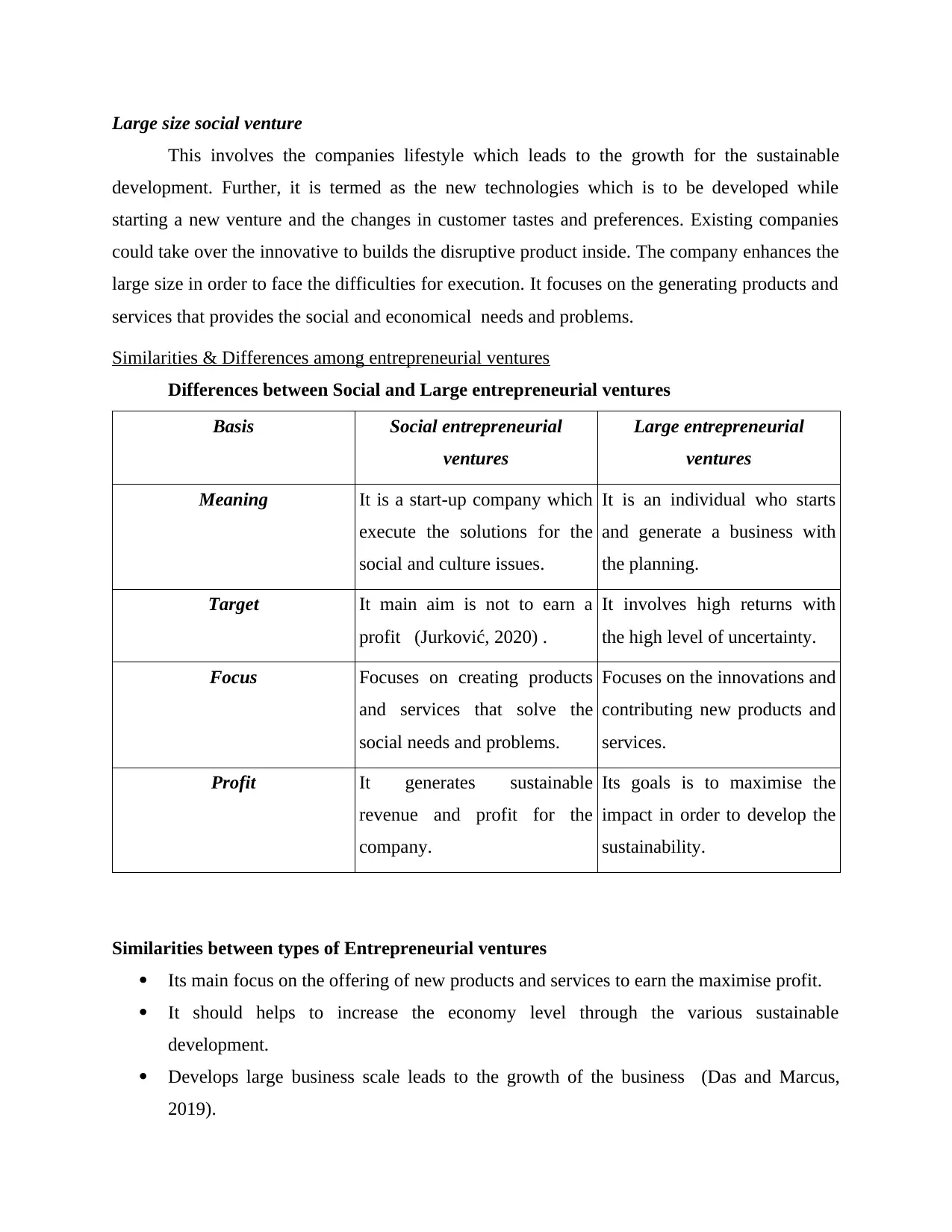
Large size social venture
This involves the companies lifestyle which leads to the growth for the sustainable
development. Further, it is termed as the new technologies which is to be developed while
starting a new venture and the changes in customer tastes and preferences. Existing companies
could take over the innovative to builds the disruptive product inside. The company enhances the
large size in order to face the difficulties for execution. It focuses on the generating products and
services that provides the social and economical needs and problems.
Similarities & Differences among entrepreneurial ventures
Differences between Social and Large entrepreneurial ventures
Basis Social entrepreneurial
ventures
Large entrepreneurial
ventures
Meaning It is a start-up company which
execute the solutions for the
social and culture issues.
It is an individual who starts
and generate a business with
the planning.
Target It main aim is not to earn a
profit (Jurković, 2020) .
It involves high returns with
the high level of uncertainty.
Focus Focuses on creating products
and services that solve the
social needs and problems.
Focuses on the innovations and
contributing new products and
services.
Profit It generates sustainable
revenue and profit for the
company.
Its goals is to maximise the
impact in order to develop the
sustainability.
Similarities between types of Entrepreneurial ventures
Its main focus on the offering of new products and services to earn the maximise profit.
It should helps to increase the economy level through the various sustainable
development.
Develops large business scale leads to the growth of the business (Das and Marcus,
2019).
This involves the companies lifestyle which leads to the growth for the sustainable
development. Further, it is termed as the new technologies which is to be developed while
starting a new venture and the changes in customer tastes and preferences. Existing companies
could take over the innovative to builds the disruptive product inside. The company enhances the
large size in order to face the difficulties for execution. It focuses on the generating products and
services that provides the social and economical needs and problems.
Similarities & Differences among entrepreneurial ventures
Differences between Social and Large entrepreneurial ventures
Basis Social entrepreneurial
ventures
Large entrepreneurial
ventures
Meaning It is a start-up company which
execute the solutions for the
social and culture issues.
It is an individual who starts
and generate a business with
the planning.
Target It main aim is not to earn a
profit (Jurković, 2020) .
It involves high returns with
the high level of uncertainty.
Focus Focuses on creating products
and services that solve the
social needs and problems.
Focuses on the innovations and
contributing new products and
services.
Profit It generates sustainable
revenue and profit for the
company.
Its goals is to maximise the
impact in order to develop the
sustainability.
Similarities between types of Entrepreneurial ventures
Its main focus on the offering of new products and services to earn the maximise profit.
It should helps to increase the economy level through the various sustainable
development.
Develops large business scale leads to the growth of the business (Das and Marcus,
2019).
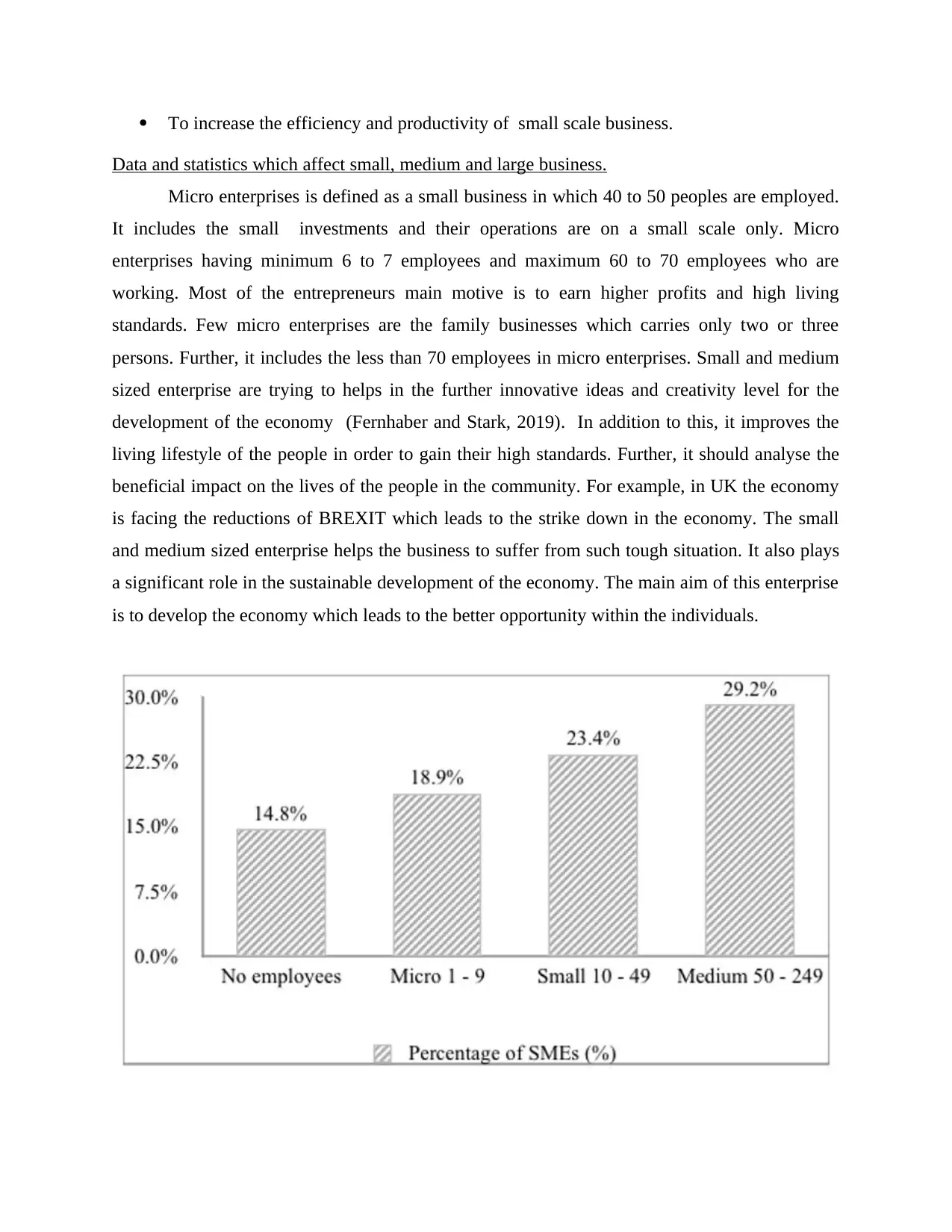
To increase the efficiency and productivity of small scale business.
Data and statistics which affect small, medium and large business.
Micro enterprises is defined as a small business in which 40 to 50 peoples are employed.
It includes the small investments and their operations are on a small scale only. Micro
enterprises having minimum 6 to 7 employees and maximum 60 to 70 employees who are
working. Most of the entrepreneurs main motive is to earn higher profits and high living
standards. Few micro enterprises are the family businesses which carries only two or three
persons. Further, it includes the less than 70 employees in micro enterprises. Small and medium
sized enterprise are trying to helps in the further innovative ideas and creativity level for the
development of the economy (Fernhaber and Stark, 2019). In addition to this, it improves the
living lifestyle of the people in order to gain their high standards. Further, it should analyse the
beneficial impact on the lives of the people in the community. For example, in UK the economy
is facing the reductions of BREXIT which leads to the strike down in the economy. The small
and medium sized enterprise helps the business to suffer from such tough situation. It also plays
a significant role in the sustainable development of the economy. The main aim of this enterprise
is to develop the economy which leads to the better opportunity within the individuals.
Data and statistics which affect small, medium and large business.
Micro enterprises is defined as a small business in which 40 to 50 peoples are employed.
It includes the small investments and their operations are on a small scale only. Micro
enterprises having minimum 6 to 7 employees and maximum 60 to 70 employees who are
working. Most of the entrepreneurs main motive is to earn higher profits and high living
standards. Few micro enterprises are the family businesses which carries only two or three
persons. Further, it includes the less than 70 employees in micro enterprises. Small and medium
sized enterprise are trying to helps in the further innovative ideas and creativity level for the
development of the economy (Fernhaber and Stark, 2019). In addition to this, it improves the
living lifestyle of the people in order to gain their high standards. Further, it should analyse the
beneficial impact on the lives of the people in the community. For example, in UK the economy
is facing the reductions of BREXIT which leads to the strike down in the economy. The small
and medium sized enterprise helps the business to suffer from such tough situation. It also plays
a significant role in the sustainable development of the economy. The main aim of this enterprise
is to develop the economy which leads to the better opportunity within the individuals.
⊘ This is a preview!⊘
Do you want full access?
Subscribe today to unlock all pages.

Trusted by 1+ million students worldwide
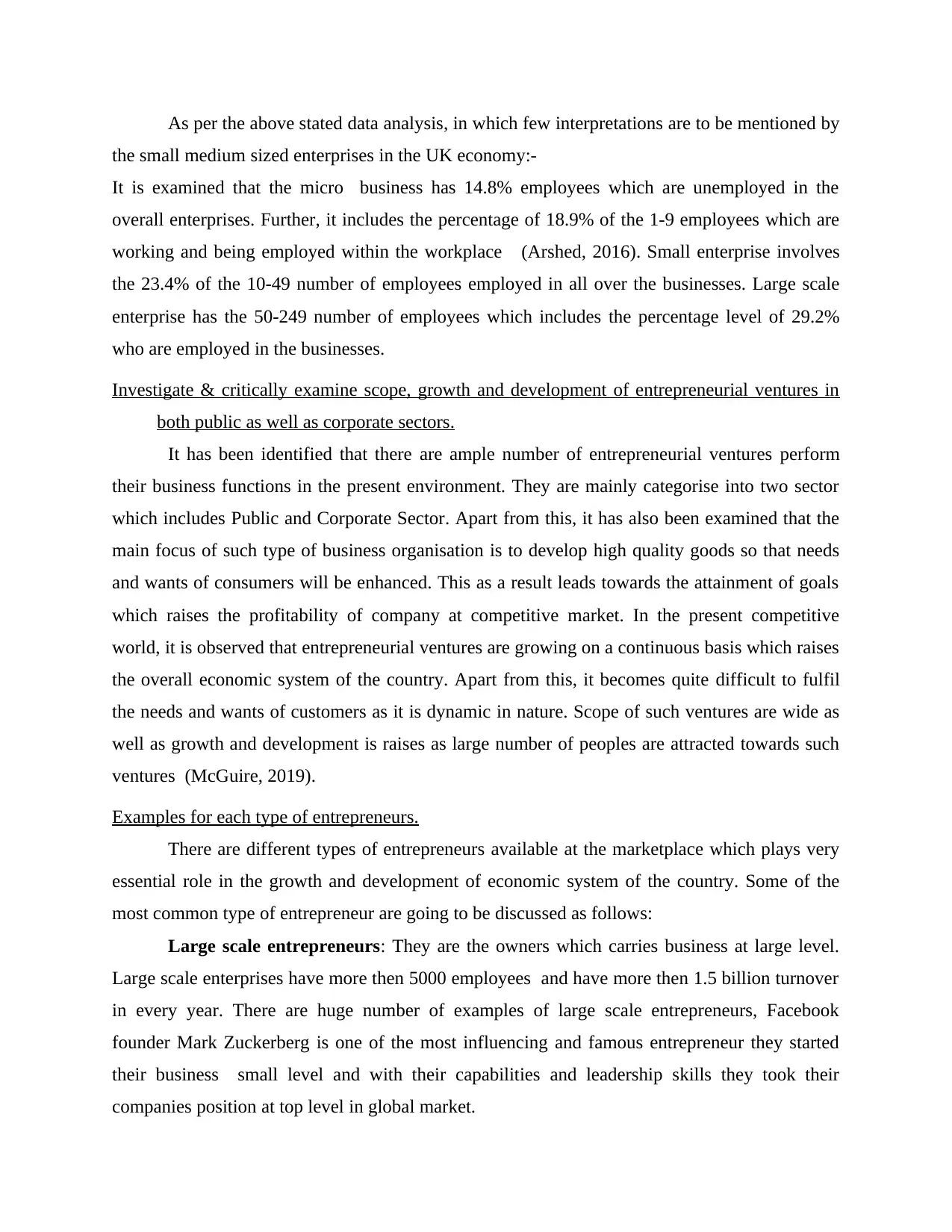
As per the above stated data analysis, in which few interpretations are to be mentioned by
the small medium sized enterprises in the UK economy:-
It is examined that the micro business has 14.8% employees which are unemployed in the
overall enterprises. Further, it includes the percentage of 18.9% of the 1-9 employees which are
working and being employed within the workplace (Arshed, 2016). Small enterprise involves
the 23.4% of the 10-49 number of employees employed in all over the businesses. Large scale
enterprise has the 50-249 number of employees which includes the percentage level of 29.2%
who are employed in the businesses.
Investigate & critically examine scope, growth and development of entrepreneurial ventures in
both public as well as corporate sectors.
It has been identified that there are ample number of entrepreneurial ventures perform
their business functions in the present environment. They are mainly categorise into two sector
which includes Public and Corporate Sector. Apart from this, it has also been examined that the
main focus of such type of business organisation is to develop high quality goods so that needs
and wants of consumers will be enhanced. This as a result leads towards the attainment of goals
which raises the profitability of company at competitive market. In the present competitive
world, it is observed that entrepreneurial ventures are growing on a continuous basis which raises
the overall economic system of the country. Apart from this, it becomes quite difficult to fulfil
the needs and wants of customers as it is dynamic in nature. Scope of such ventures are wide as
well as growth and development is raises as large number of peoples are attracted towards such
ventures (McGuire, 2019).
Examples for each type of entrepreneurs.
There are different types of entrepreneurs available at the marketplace which plays very
essential role in the growth and development of economic system of the country. Some of the
most common type of entrepreneur are going to be discussed as follows:
Large scale entrepreneurs: They are the owners which carries business at large level.
Large scale enterprises have more then 5000 employees and have more then 1.5 billion turnover
in every year. There are huge number of examples of large scale entrepreneurs, Facebook
founder Mark Zuckerberg is one of the most influencing and famous entrepreneur they started
their business small level and with their capabilities and leadership skills they took their
companies position at top level in global market.
the small medium sized enterprises in the UK economy:-
It is examined that the micro business has 14.8% employees which are unemployed in the
overall enterprises. Further, it includes the percentage of 18.9% of the 1-9 employees which are
working and being employed within the workplace (Arshed, 2016). Small enterprise involves
the 23.4% of the 10-49 number of employees employed in all over the businesses. Large scale
enterprise has the 50-249 number of employees which includes the percentage level of 29.2%
who are employed in the businesses.
Investigate & critically examine scope, growth and development of entrepreneurial ventures in
both public as well as corporate sectors.
It has been identified that there are ample number of entrepreneurial ventures perform
their business functions in the present environment. They are mainly categorise into two sector
which includes Public and Corporate Sector. Apart from this, it has also been examined that the
main focus of such type of business organisation is to develop high quality goods so that needs
and wants of consumers will be enhanced. This as a result leads towards the attainment of goals
which raises the profitability of company at competitive market. In the present competitive
world, it is observed that entrepreneurial ventures are growing on a continuous basis which raises
the overall economic system of the country. Apart from this, it becomes quite difficult to fulfil
the needs and wants of customers as it is dynamic in nature. Scope of such ventures are wide as
well as growth and development is raises as large number of peoples are attracted towards such
ventures (McGuire, 2019).
Examples for each type of entrepreneurs.
There are different types of entrepreneurs available at the marketplace which plays very
essential role in the growth and development of economic system of the country. Some of the
most common type of entrepreneur are going to be discussed as follows:
Large scale entrepreneurs: They are the owners which carries business at large level.
Large scale enterprises have more then 5000 employees and have more then 1.5 billion turnover
in every year. There are huge number of examples of large scale entrepreneurs, Facebook
founder Mark Zuckerberg is one of the most influencing and famous entrepreneur they started
their business small level and with their capabilities and leadership skills they took their
companies position at top level in global market.
Paraphrase This Document
Need a fresh take? Get an instant paraphrase of this document with our AI Paraphraser
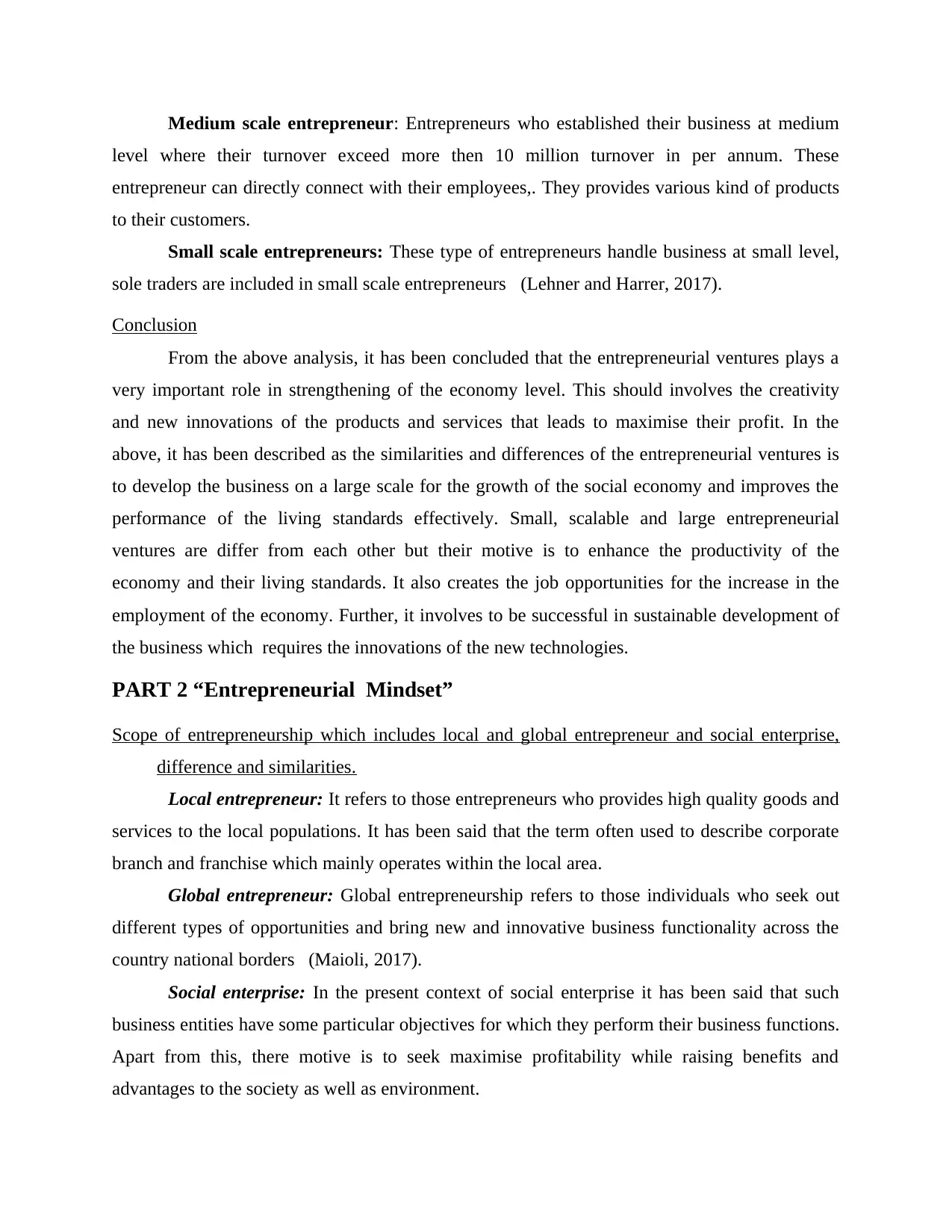
Medium scale entrepreneur: Entrepreneurs who established their business at medium
level where their turnover exceed more then 10 million turnover in per annum. These
entrepreneur can directly connect with their employees,. They provides various kind of products
to their customers.
Small scale entrepreneurs: These type of entrepreneurs handle business at small level,
sole traders are included in small scale entrepreneurs (Lehner and Harrer, 2017).
Conclusion
From the above analysis, it has been concluded that the entrepreneurial ventures plays a
very important role in strengthening of the economy level. This should involves the creativity
and new innovations of the products and services that leads to maximise their profit. In the
above, it has been described as the similarities and differences of the entrepreneurial ventures is
to develop the business on a large scale for the growth of the social economy and improves the
performance of the living standards effectively. Small, scalable and large entrepreneurial
ventures are differ from each other but their motive is to enhance the productivity of the
economy and their living standards. It also creates the job opportunities for the increase in the
employment of the economy. Further, it involves to be successful in sustainable development of
the business which requires the innovations of the new technologies.
PART 2 “Entrepreneurial Mindset”
Scope of entrepreneurship which includes local and global entrepreneur and social enterprise,
difference and similarities.
Local entrepreneur: It refers to those entrepreneurs who provides high quality goods and
services to the local populations. It has been said that the term often used to describe corporate
branch and franchise which mainly operates within the local area.
Global entrepreneur: Global entrepreneurship refers to those individuals who seek out
different types of opportunities and bring new and innovative business functionality across the
country national borders (Maioli, 2017).
Social enterprise: In the present context of social enterprise it has been said that such
business entities have some particular objectives for which they perform their business functions.
Apart from this, there motive is to seek maximise profitability while raising benefits and
advantages to the society as well as environment.
level where their turnover exceed more then 10 million turnover in per annum. These
entrepreneur can directly connect with their employees,. They provides various kind of products
to their customers.
Small scale entrepreneurs: These type of entrepreneurs handle business at small level,
sole traders are included in small scale entrepreneurs (Lehner and Harrer, 2017).
Conclusion
From the above analysis, it has been concluded that the entrepreneurial ventures plays a
very important role in strengthening of the economy level. This should involves the creativity
and new innovations of the products and services that leads to maximise their profit. In the
above, it has been described as the similarities and differences of the entrepreneurial ventures is
to develop the business on a large scale for the growth of the social economy and improves the
performance of the living standards effectively. Small, scalable and large entrepreneurial
ventures are differ from each other but their motive is to enhance the productivity of the
economy and their living standards. It also creates the job opportunities for the increase in the
employment of the economy. Further, it involves to be successful in sustainable development of
the business which requires the innovations of the new technologies.
PART 2 “Entrepreneurial Mindset”
Scope of entrepreneurship which includes local and global entrepreneur and social enterprise,
difference and similarities.
Local entrepreneur: It refers to those entrepreneurs who provides high quality goods and
services to the local populations. It has been said that the term often used to describe corporate
branch and franchise which mainly operates within the local area.
Global entrepreneur: Global entrepreneurship refers to those individuals who seek out
different types of opportunities and bring new and innovative business functionality across the
country national borders (Maioli, 2017).
Social enterprise: In the present context of social enterprise it has been said that such
business entities have some particular objectives for which they perform their business functions.
Apart from this, there motive is to seek maximise profitability while raising benefits and
advantages to the society as well as environment.
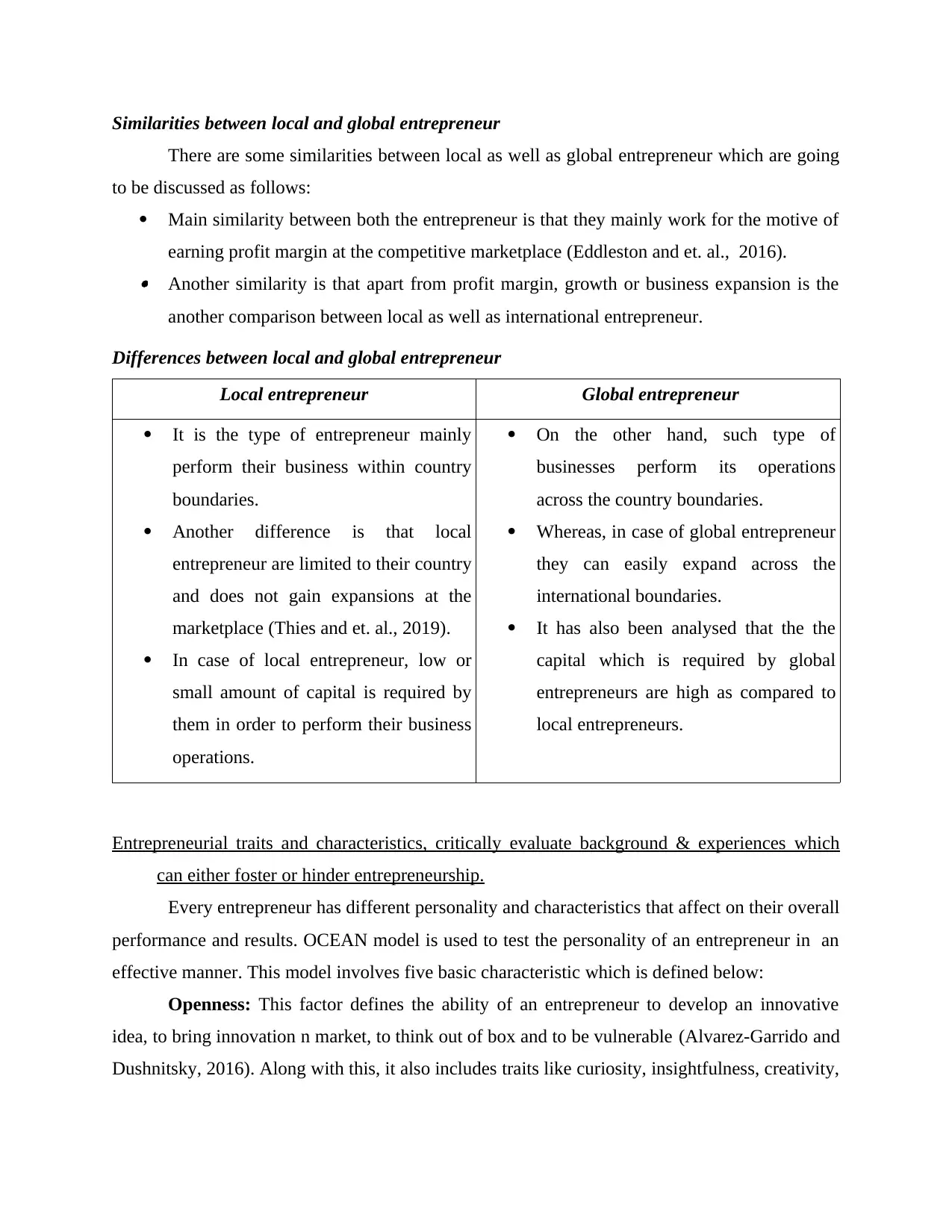
Similarities between local and global entrepreneur
There are some similarities between local as well as global entrepreneur which are going
to be discussed as follows:
Main similarity between both the entrepreneur is that they mainly work for the motive of
earning profit margin at the competitive marketplace (Eddleston and et. al., 2016). Another similarity is that apart from profit margin, growth or business expansion is the
another comparison between local as well as international entrepreneur.
Differences between local and global entrepreneur
Local entrepreneur Global entrepreneur
It is the type of entrepreneur mainly
perform their business within country
boundaries.
Another difference is that local
entrepreneur are limited to their country
and does not gain expansions at the
marketplace (Thies and et. al., 2019).
In case of local entrepreneur, low or
small amount of capital is required by
them in order to perform their business
operations.
On the other hand, such type of
businesses perform its operations
across the country boundaries.
Whereas, in case of global entrepreneur
they can easily expand across the
international boundaries.
It has also been analysed that the the
capital which is required by global
entrepreneurs are high as compared to
local entrepreneurs.
Entrepreneurial traits and characteristics, critically evaluate background & experiences which
can either foster or hinder entrepreneurship.
Every entrepreneur has different personality and characteristics that affect on their overall
performance and results. OCEAN model is used to test the personality of an entrepreneur in an
effective manner. This model involves five basic characteristic which is defined below:
Openness: This factor defines the ability of an entrepreneur to develop an innovative
idea, to bring innovation n market, to think out of box and to be vulnerable (Alvarez‐Garrido and
Dushnitsky, 2016). Along with this, it also includes traits like curiosity, insightfulness, creativity,
There are some similarities between local as well as global entrepreneur which are going
to be discussed as follows:
Main similarity between both the entrepreneur is that they mainly work for the motive of
earning profit margin at the competitive marketplace (Eddleston and et. al., 2016). Another similarity is that apart from profit margin, growth or business expansion is the
another comparison between local as well as international entrepreneur.
Differences between local and global entrepreneur
Local entrepreneur Global entrepreneur
It is the type of entrepreneur mainly
perform their business within country
boundaries.
Another difference is that local
entrepreneur are limited to their country
and does not gain expansions at the
marketplace (Thies and et. al., 2019).
In case of local entrepreneur, low or
small amount of capital is required by
them in order to perform their business
operations.
On the other hand, such type of
businesses perform its operations
across the country boundaries.
Whereas, in case of global entrepreneur
they can easily expand across the
international boundaries.
It has also been analysed that the the
capital which is required by global
entrepreneurs are high as compared to
local entrepreneurs.
Entrepreneurial traits and characteristics, critically evaluate background & experiences which
can either foster or hinder entrepreneurship.
Every entrepreneur has different personality and characteristics that affect on their overall
performance and results. OCEAN model is used to test the personality of an entrepreneur in an
effective manner. This model involves five basic characteristic which is defined below:
Openness: This factor defines the ability of an entrepreneur to develop an innovative
idea, to bring innovation n market, to think out of box and to be vulnerable (Alvarez‐Garrido and
Dushnitsky, 2016). Along with this, it also includes traits like curiosity, insightfulness, creativity,
⊘ This is a preview!⊘
Do you want full access?
Subscribe today to unlock all pages.

Trusted by 1+ million students worldwide
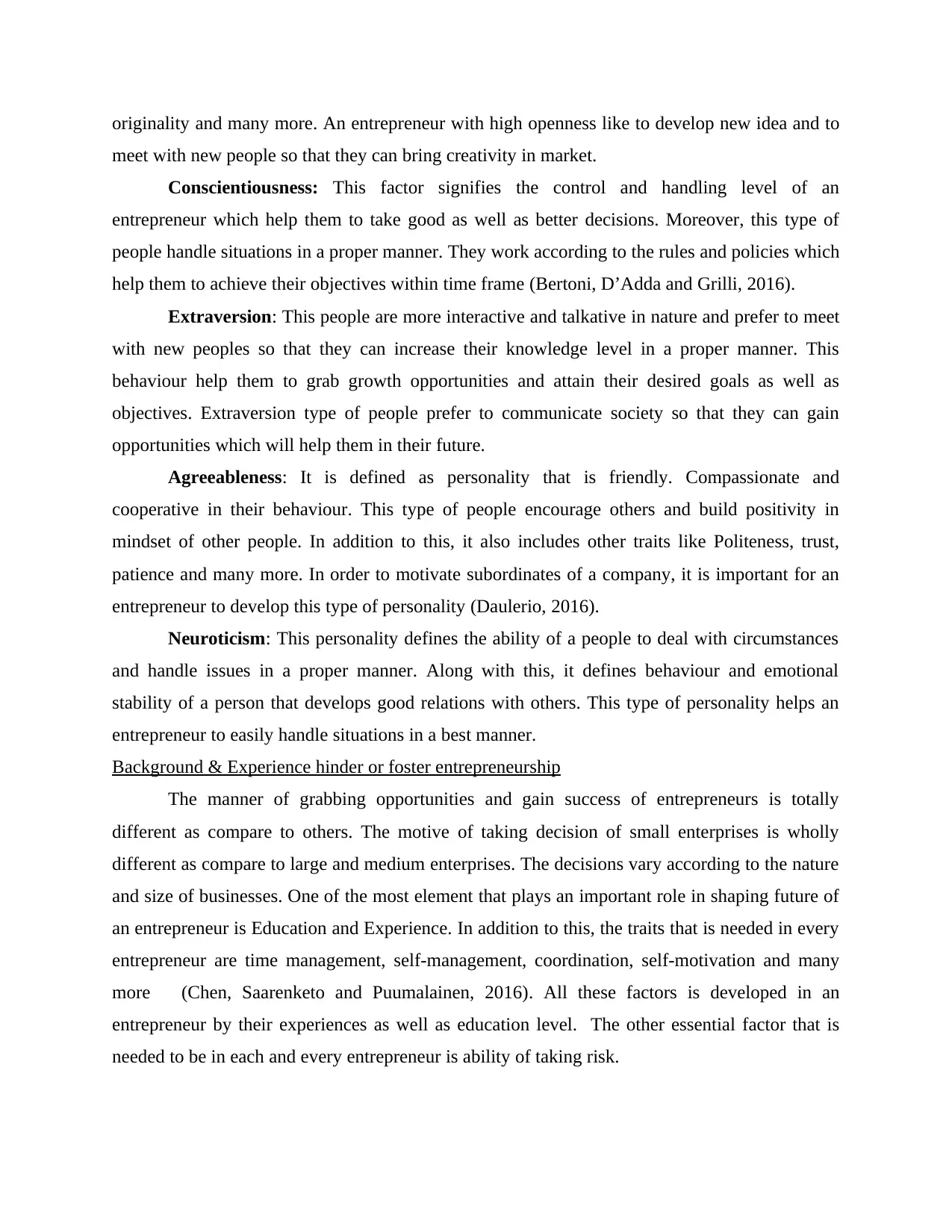
originality and many more. An entrepreneur with high openness like to develop new idea and to
meet with new people so that they can bring creativity in market.
Conscientiousness: This factor signifies the control and handling level of an
entrepreneur which help them to take good as well as better decisions. Moreover, this type of
people handle situations in a proper manner. They work according to the rules and policies which
help them to achieve their objectives within time frame (Bertoni, D’Adda and Grilli, 2016).
Extraversion: This people are more interactive and talkative in nature and prefer to meet
with new peoples so that they can increase their knowledge level in a proper manner. This
behaviour help them to grab growth opportunities and attain their desired goals as well as
objectives. Extraversion type of people prefer to communicate society so that they can gain
opportunities which will help them in their future.
Agreeableness: It is defined as personality that is friendly. Compassionate and
cooperative in their behaviour. This type of people encourage others and build positivity in
mindset of other people. In addition to this, it also includes other traits like Politeness, trust,
patience and many more. In order to motivate subordinates of a company, it is important for an
entrepreneur to develop this type of personality (Daulerio, 2016).
Neuroticism: This personality defines the ability of a people to deal with circumstances
and handle issues in a proper manner. Along with this, it defines behaviour and emotional
stability of a person that develops good relations with others. This type of personality helps an
entrepreneur to easily handle situations in a best manner.
Background & Experience hinder or foster entrepreneurship
The manner of grabbing opportunities and gain success of entrepreneurs is totally
different as compare to others. The motive of taking decision of small enterprises is wholly
different as compare to large and medium enterprises. The decisions vary according to the nature
and size of businesses. One of the most element that plays an important role in shaping future of
an entrepreneur is Education and Experience. In addition to this, the traits that is needed in every
entrepreneur are time management, self-management, coordination, self-motivation and many
more (Chen, Saarenketo and Puumalainen, 2016). All these factors is developed in an
entrepreneur by their experiences as well as education level. The other essential factor that is
needed to be in each and every entrepreneur is ability of taking risk.
meet with new people so that they can bring creativity in market.
Conscientiousness: This factor signifies the control and handling level of an
entrepreneur which help them to take good as well as better decisions. Moreover, this type of
people handle situations in a proper manner. They work according to the rules and policies which
help them to achieve their objectives within time frame (Bertoni, D’Adda and Grilli, 2016).
Extraversion: This people are more interactive and talkative in nature and prefer to meet
with new peoples so that they can increase their knowledge level in a proper manner. This
behaviour help them to grab growth opportunities and attain their desired goals as well as
objectives. Extraversion type of people prefer to communicate society so that they can gain
opportunities which will help them in their future.
Agreeableness: It is defined as personality that is friendly. Compassionate and
cooperative in their behaviour. This type of people encourage others and build positivity in
mindset of other people. In addition to this, it also includes other traits like Politeness, trust,
patience and many more. In order to motivate subordinates of a company, it is important for an
entrepreneur to develop this type of personality (Daulerio, 2016).
Neuroticism: This personality defines the ability of a people to deal with circumstances
and handle issues in a proper manner. Along with this, it defines behaviour and emotional
stability of a person that develops good relations with others. This type of personality helps an
entrepreneur to easily handle situations in a best manner.
Background & Experience hinder or foster entrepreneurship
The manner of grabbing opportunities and gain success of entrepreneurs is totally
different as compare to others. The motive of taking decision of small enterprises is wholly
different as compare to large and medium enterprises. The decisions vary according to the nature
and size of businesses. One of the most element that plays an important role in shaping future of
an entrepreneur is Education and Experience. In addition to this, the traits that is needed in every
entrepreneur are time management, self-management, coordination, self-motivation and many
more (Chen, Saarenketo and Puumalainen, 2016). All these factors is developed in an
entrepreneur by their experiences as well as education level. The other essential factor that is
needed to be in each and every entrepreneur is ability of taking risk.
Paraphrase This Document
Need a fresh take? Get an instant paraphrase of this document with our AI Paraphraser
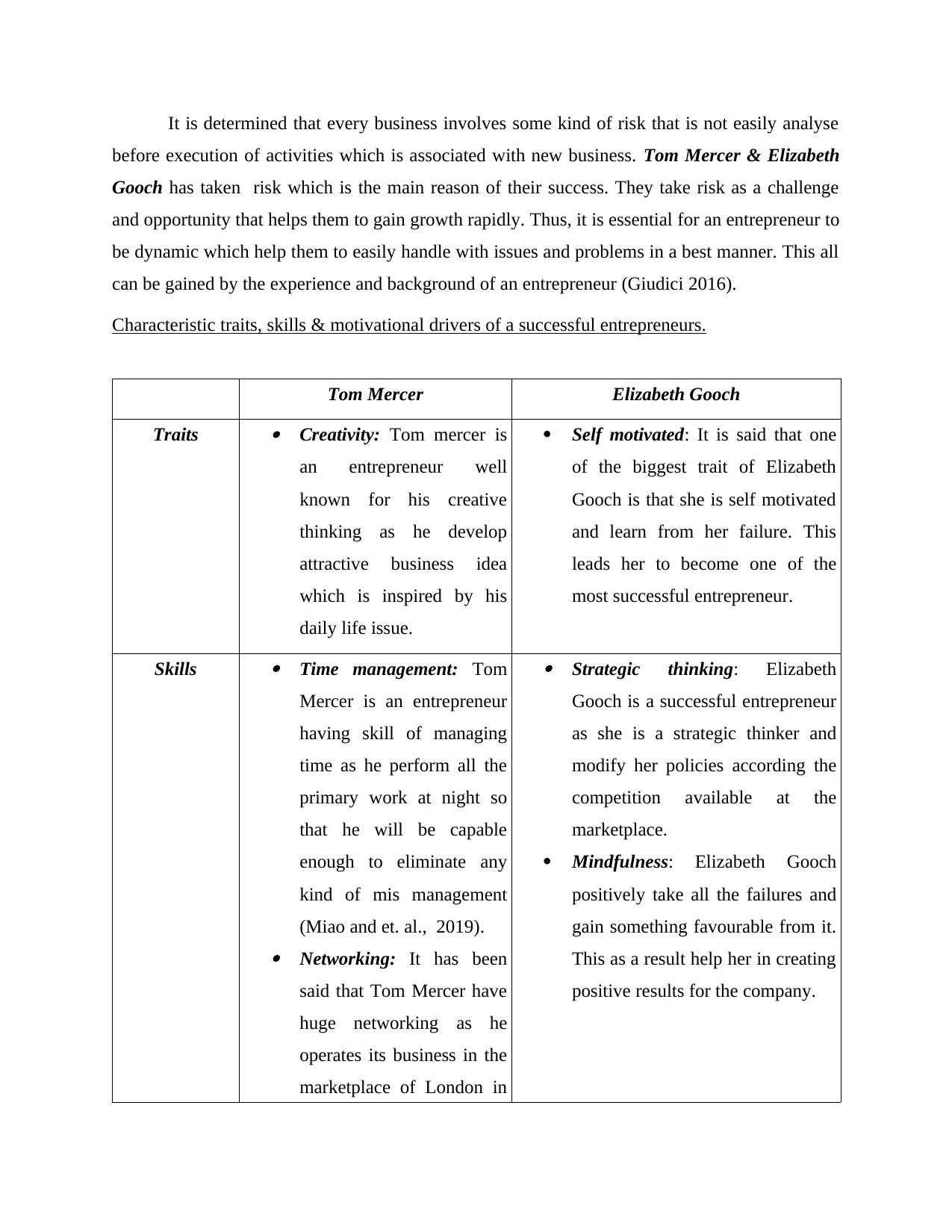
It is determined that every business involves some kind of risk that is not easily analyse
before execution of activities which is associated with new business. Tom Mercer & Elizabeth
Gooch has taken risk which is the main reason of their success. They take risk as a challenge
and opportunity that helps them to gain growth rapidly. Thus, it is essential for an entrepreneur to
be dynamic which help them to easily handle with issues and problems in a best manner. This all
can be gained by the experience and background of an entrepreneur (Giudici 2016).
Characteristic traits, skills & motivational drivers of a successful entrepreneurs.
Tom Mercer Elizabeth Gooch
Traits
Creativity: Tom mercer is
an entrepreneur well
known for his creative
thinking as he develop
attractive business idea
which is inspired by his
daily life issue.
Self motivated: It is said that one
of the biggest trait of Elizabeth
Gooch is that she is self motivated
and learn from her failure. This
leads her to become one of the
most successful entrepreneur.
Skills
Time management: Tom
Mercer is an entrepreneur
having skill of managing
time as he perform all the
primary work at night so
that he will be capable
enough to eliminate any
kind of mis management
(Miao and et. al., 2019).
Networking: It has been
said that Tom Mercer have
huge networking as he
operates its business in the
marketplace of London in
Strategic thinking: Elizabeth
Gooch is a successful entrepreneur
as she is a strategic thinker and
modify her policies according the
competition available at the
marketplace.
Mindfulness: Elizabeth Gooch
positively take all the failures and
gain something favourable from it.
This as a result help her in creating
positive results for the company.
before execution of activities which is associated with new business. Tom Mercer & Elizabeth
Gooch has taken risk which is the main reason of their success. They take risk as a challenge
and opportunity that helps them to gain growth rapidly. Thus, it is essential for an entrepreneur to
be dynamic which help them to easily handle with issues and problems in a best manner. This all
can be gained by the experience and background of an entrepreneur (Giudici 2016).
Characteristic traits, skills & motivational drivers of a successful entrepreneurs.
Tom Mercer Elizabeth Gooch
Traits
Creativity: Tom mercer is
an entrepreneur well
known for his creative
thinking as he develop
attractive business idea
which is inspired by his
daily life issue.
Self motivated: It is said that one
of the biggest trait of Elizabeth
Gooch is that she is self motivated
and learn from her failure. This
leads her to become one of the
most successful entrepreneur.
Skills
Time management: Tom
Mercer is an entrepreneur
having skill of managing
time as he perform all the
primary work at night so
that he will be capable
enough to eliminate any
kind of mis management
(Miao and et. al., 2019).
Networking: It has been
said that Tom Mercer have
huge networking as he
operates its business in the
marketplace of London in
Strategic thinking: Elizabeth
Gooch is a successful entrepreneur
as she is a strategic thinker and
modify her policies according the
competition available at the
marketplace.
Mindfulness: Elizabeth Gooch
positively take all the failures and
gain something favourable from it.
This as a result help her in creating
positive results for the company.
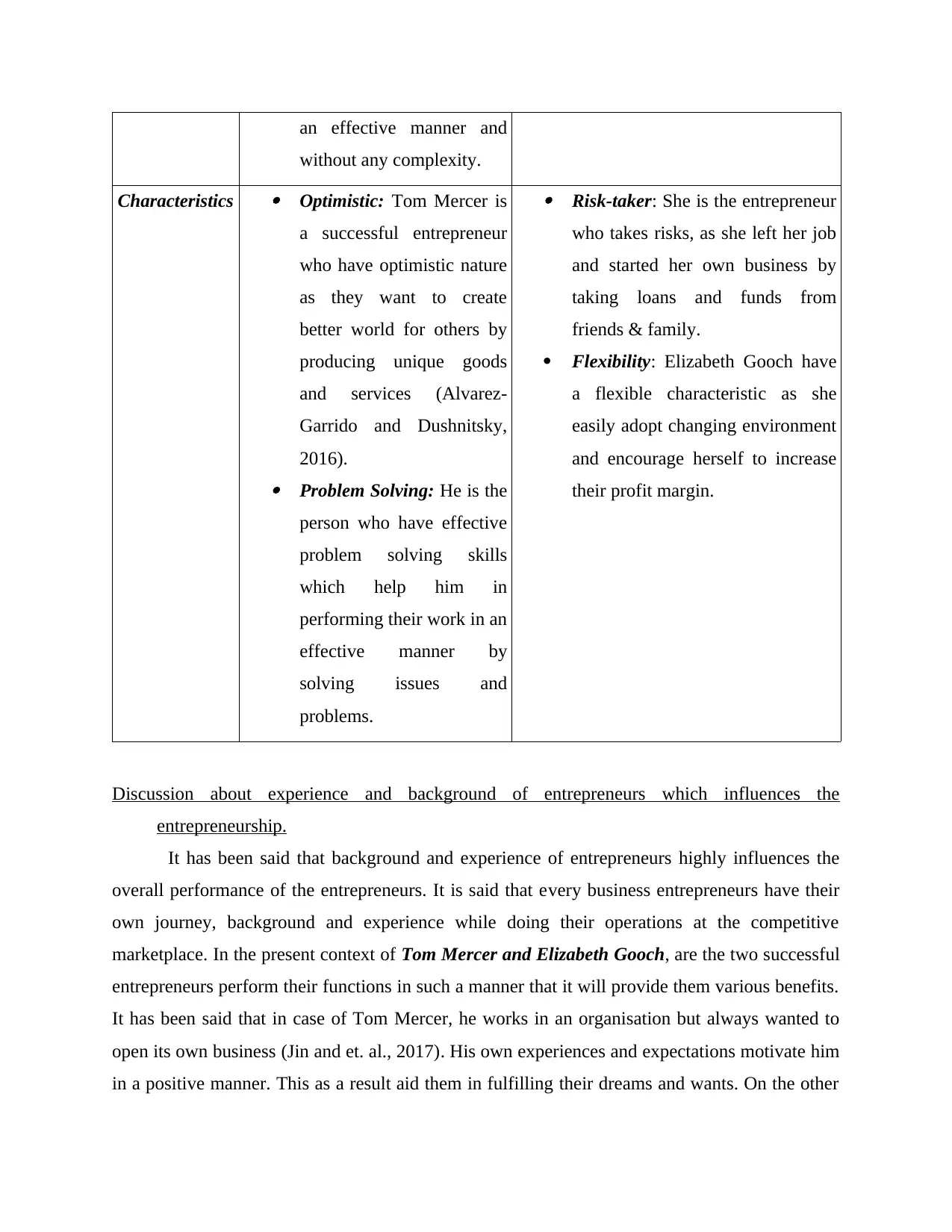
an effective manner and
without any complexity.
Characteristics
Optimistic: Tom Mercer is
a successful entrepreneur
who have optimistic nature
as they want to create
better world for others by
producing unique goods
and services (Alvarez‐
Garrido and Dushnitsky,
2016).
Problem Solving: He is the
person who have effective
problem solving skills
which help him in
performing their work in an
effective manner by
solving issues and
problems.
Risk-taker: She is the entrepreneur
who takes risks, as she left her job
and started her own business by
taking loans and funds from
friends & family.
Flexibility: Elizabeth Gooch have
a flexible characteristic as she
easily adopt changing environment
and encourage herself to increase
their profit margin.
Discussion about experience and background of entrepreneurs which influences the
entrepreneurship.
It has been said that background and experience of entrepreneurs highly influences the
overall performance of the entrepreneurs. It is said that every business entrepreneurs have their
own journey, background and experience while doing their operations at the competitive
marketplace. In the present context of Tom Mercer and Elizabeth Gooch, are the two successful
entrepreneurs perform their functions in such a manner that it will provide them various benefits.
It has been said that in case of Tom Mercer, he works in an organisation but always wanted to
open its own business (Jin and et. al., 2017). His own experiences and expectations motivate him
in a positive manner. This as a result aid them in fulfilling their dreams and wants. On the other
without any complexity.
Characteristics
Optimistic: Tom Mercer is
a successful entrepreneur
who have optimistic nature
as they want to create
better world for others by
producing unique goods
and services (Alvarez‐
Garrido and Dushnitsky,
2016).
Problem Solving: He is the
person who have effective
problem solving skills
which help him in
performing their work in an
effective manner by
solving issues and
problems.
Risk-taker: She is the entrepreneur
who takes risks, as she left her job
and started her own business by
taking loans and funds from
friends & family.
Flexibility: Elizabeth Gooch have
a flexible characteristic as she
easily adopt changing environment
and encourage herself to increase
their profit margin.
Discussion about experience and background of entrepreneurs which influences the
entrepreneurship.
It has been said that background and experience of entrepreneurs highly influences the
overall performance of the entrepreneurs. It is said that every business entrepreneurs have their
own journey, background and experience while doing their operations at the competitive
marketplace. In the present context of Tom Mercer and Elizabeth Gooch, are the two successful
entrepreneurs perform their functions in such a manner that it will provide them various benefits.
It has been said that in case of Tom Mercer, he works in an organisation but always wanted to
open its own business (Jin and et. al., 2017). His own experiences and expectations motivate him
in a positive manner. This as a result aid them in fulfilling their dreams and wants. On the other
⊘ This is a preview!⊘
Do you want full access?
Subscribe today to unlock all pages.

Trusted by 1+ million students worldwide
1 out of 16
Related Documents
Your All-in-One AI-Powered Toolkit for Academic Success.
+13062052269
info@desklib.com
Available 24*7 on WhatsApp / Email
![[object Object]](/_next/static/media/star-bottom.7253800d.svg)
Unlock your academic potential
Copyright © 2020–2025 A2Z Services. All Rights Reserved. Developed and managed by ZUCOL.


